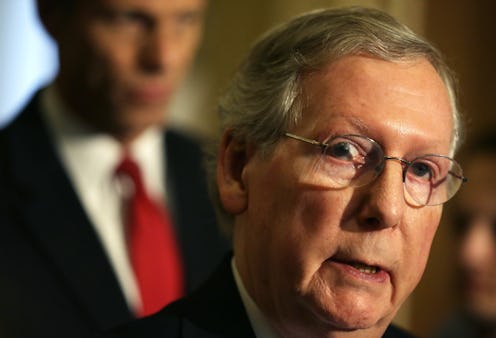News
GOP Likes The Minimum Wage Exactly As It Is
On Wednesday afternoon, Senate Republicans blocked the minimum wage increase proposal which President Obama and congressional Democrats have been championing for months. On a virtual party-line vote of 54-42, the Senate's Democratic majority was unable to breach the 60-vote supermajority necessary to overcome a filibuster, the Republican Party's favored, go-to legislative power over the course of the Obama presidency. Senate Majority Leader Harry Reid voted against the bill for procedural reasons, allowing him to bring the bill up again for a later vote.
Increasing the federal minimum wage has rapidly become a major, if not keystone, issue for the Democratic Party leading up to the 2014 midterm elections. It's easy to see why — in a modern political landscape as polarized as ever, polling has shown a broad base of bipartisan support for upping the lowest hourly wages. While Democrats consistently poll at a much higher level of support for the idea, a little over half of Republicans support it too. The federal minimum wage currently sits at just $7.25 per hour, and the proposal by President Obama, backed by congressional Democrats, would increase it to $10.10 per hour.
It comes as little surprise that the GOP blocked the bill, all things considered. Beyond the fact that they've taken Senate obstructionism to dizzying new heights throughout the Obama presidency, they're also historically opposed to increasing the minimum wage.
The question practically calls out, then — what exactly do voting members of the Republican Party consider a fair minimum wage to be?
Some, like Senator Lamar Alexander of Tennessee (the Republican's ranking member on the Senate labor committee) would prefer the entire concept of the minimum wage be abolished. Alexander admitted as much during a June 2013 hearing, challenged by Vermont Senator Bernie Sanders — the only self-avowed Socialist in the U.S. Senate, and a champion of progressive policy on income inequality.
For some perspective on the ideological bedrock: As recently as 2007, the federal minimum wage wasn't even the modest $7.25 it is today. Prior to the signing of the Fair Minimum Wage Act of 2007, it stood at a relatively paltry $5.15 per hour.
The bill to raise it, spearheaded by a Democratic congress and ultimately signed as part of an Iraq War aid bill by President George W. Bush, was not exactly embraced by elected Republicans at the time. Over half of the House's Republican membership voted against it, and Senate Republicans (surprise, surprise) filibustered the bill, only allowing an up-or-down vote after getting some tax cuts sprinkled in.
In short, this is in no sense the kind of economic policy the GOP wants to support, absent of some serious arm-twisting. But they could cave in eventually — as a political issue, it's very much a one-way ratchet. It's not that hard to sell people on more money in their pocket, especially otherwise struggling people whose labor deserves more than it earns. It's a lot harder to convince people the other way, ideological purity be damned.
